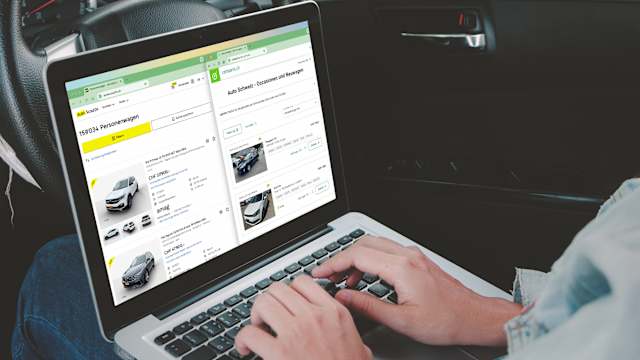Fake listings: how to avoid scams on online car portals
A barely driven luxury sedan for 10,000 francs or an almost new Golf for even less? Comparis explains how to spot fake ads and deal with scams.

27.09.2024

iStock/PeopleImages
1. How do the scams work?
Time and again, consumers fall victim to fraudulent car advertisements. The scams often follow the same pattern:
You come across a bargain listing
The fraudsters place an advertisement on a used car portal. The listing presents a car at a very low price. Keen to secure the bargain, you contact the seller.
The seller is abroad
Unfortunately, the seller is supposedly abroad right now – and so is the vehicle. A viewing is therefore not possible.
You are asked to pay a deposit
The seller suddenly demands a deposit, often through a third-party company or forwarder. You are asked to prove that you’re serious about buying. This is the last opportunity to break off contact and report the advertiser on the portal. If you transfer the money, you’re very likely to never see it again.
2. How can I tell if a listing is fake?
There are various signs that indicate a listing isn’t real. Here’s a brief overview:
The price of the vehicle is too good to be true.
The seller wants to communicate via email or a messaging service like Whatsapp.
The same photos of the vehicle are used for multiple fraudulent advertisements. So beware if you have seen a photo before.
The seller is abroad and you don’t have the option to inspect the vehicle.
The listing is well formulated, but in subsequent communication the seller’s messages are full of language errors.
You are told to make an advance payment outside the platform.
Once you’ve found a listing that meets one or more of these criteria, steer clear of it and report it directly on the platform.
3. What does Comparis do about fraudsters?
At Comparis you’ll find the listings of various Swiss second-hand car portals. Many fakes are filtered out when the ads are imported.
If you still see suspicious listings on our website, report it directly or write to us at info@comparis.ch. We check every report and delete the listing if it’s a fake.
4. What should I do if I’ve been duped by a fraudster?
Have you already fallen into the trap of a scammer? Here’s what you need to do now:
Immediately inform the platform operators of the incident. They can remove the fraudulent listing.
Has the payment not yet been finalized? Then contact the bank or payment service provider (e.g. Paypal) immediately. You may still be able to stop the payment.
Inform your bank even if the money has already been transferred. You can try to initiate a chargeback. However, the chances of success are often low.
Notify the police. You’ll need to disclose all the information about the case that you have available. This includes: correspondence with the seller, payment details and a screenshot or printout of the listing. This helps the police to find the scammer.
Once again, the chances of success are usually relatively small. The scammers are often located abroad.
Some home contents insurance policies include protection against online fraud or at least offer it as supplemental insurance. Ask your insurance provider whether this is also the case for you.
Does your current home contents insurance not cover the loss? Then it may be time to reevaluate your needs. Check your insurance options.
Are you looking for a new vehicle?
Whether new or second-hand, at Comparis you can find the listings of the major Swiss car marketplaces at a glance.
This article was first published on 07.05.2018




